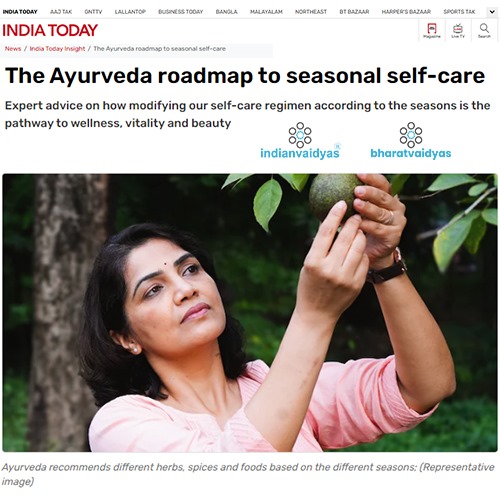The Ayurveda roadmap to seasonal self-care
01-Aug-24 06:04:14

Expert advice on how modifying our self-care regimen according to the seasons is the pathway to wellness, vitality and beauty
You are doing good if you feel so. The world over, we realised the importance of it all the more when the Covid pandemic locked us all home. This was also the time when many discovered what ayurveda has been telling us about self-care and wellness for ages. Perhaps it’s time to go back to our roots and find out what this ancient science of balance, wellbeing and beauty has to say about seasonal self-care.
“Have you ever felt sluggish in the winter, bursting with energy in spring or inexplicably irritable come summer? These seasonal shifts aren’t just a figment of your imagination. Ayurveda reveals a profound connection between the natural world and our inner wellbeing,” says Dr Karthik Krishnan from Arya Vaidya Pharmacy, a Delhi-based company specialising in ayurveda.
Cool customer
With the arrival of summer, temperatures soar. “The season is associated with pitta dosha. Our diets should shift toward cool, light foods that embody sweet, bitter and astringent flavours. Staying hydrated with cool (not cold) fluids is crucial, so favour seasonal fruits and salads that refresh the body,” says Dr Krishnan.
He also recommends limiting heavy physical exertion and protecting ourselves from direct sunlight by wearing light, breathable fabrics. “Finding respite in cool baths and prioritising rest during the hottest parts of the day can help maintain balance. Using cooling herbs, such as neem and aloe vera, will soothe the body,” shares Dr Krishnan.
During the downpour
While rain brings some much-needed respite from the summer sun, it also increases humidity. “Our digestive fire may weaken, increasing vata dosha. This season calls for warm, light and easily digestible foods that favour sour and salty tastes. Avoid cold and damp environments, ensuring we wear dry, comfortable clothing. Engage in moderate exercise to support circulation while being mindful to avoid excessive strain,” says Dr Krishnan. You should also focus on well-cooked meals, old grains and digestion-enhancing herbs, such as ginger and turmeric, to strengthen digestive health.
Welcome change
Autumn brings a shift toward hot and moist conditions. “This can aggravate pitta dosha. During this time, our diet should centre on cool, light foods with mildly sweet and bitter flavours. Incorporating grains such as barley and millet, along with cooling fruits, can help balance pitta. Engaging in calming activities, avoiding direct sun exposure, and practising meditation are essential for maintaining harmony,” says Dr Krishnan. He also recommends using cooling herbs such as mint.
Warm and inviting
According to ayurveda, since winter is a cold and dry climate, it heightens the digestive fire. “This season calls for warm, comforting foods rich in sweet, sour and salty flavours. Nourishing staples, such as hearty grains, dairy and healthy fats, are essential for sustaining energy and warmth. Regular massages (abhyanga) with warm oils not only nourish the skin but also enhance circulation, helping us combat the chill,” says Dr Krishnan.
Seeking sunlight and wearing layered clothing can protect from the cold while strength-building exercises keep the body active and resilient. “Incorporating herbal oils and seasonal herbs like amla, along with warm fluids, can fortify our defences against dryness and fatigue,” he adds.
Spring sensation
“As spring arrives, the shift toward mild and moist conditions can lead to an aggravation of kapha dosha. This is the perfect time to embrace light, easily digestible foods,” says Dr Krishnan. He suggests incorporating more bitter and astringent flavours, such as greens and lentils. “Regular exercise revitalises the body while practices like dry massage (udvartana) stimulate circulation and energy. Detoxification becomes important; consider incorporating cleansing practices like vamana (emesis) and nasya (nasal cleansing) to remove toxins. Spring herbs such as turmeric and triphala can support this process, promoting clarity and vitality,” he says.
SOURCE & CREDIT: INDIA TODAY